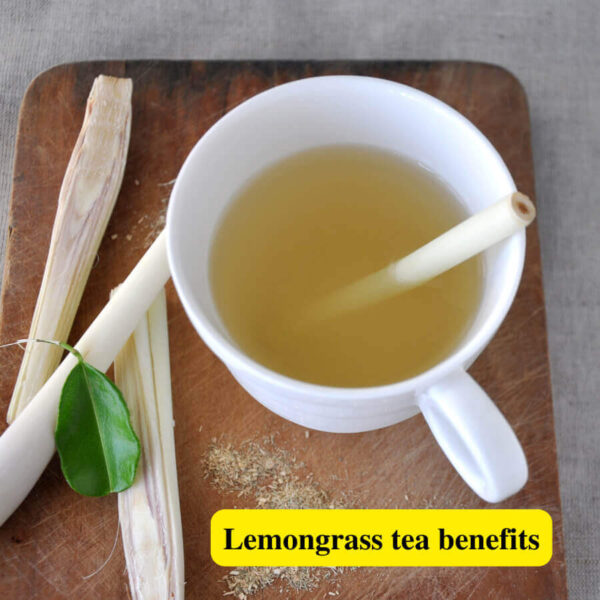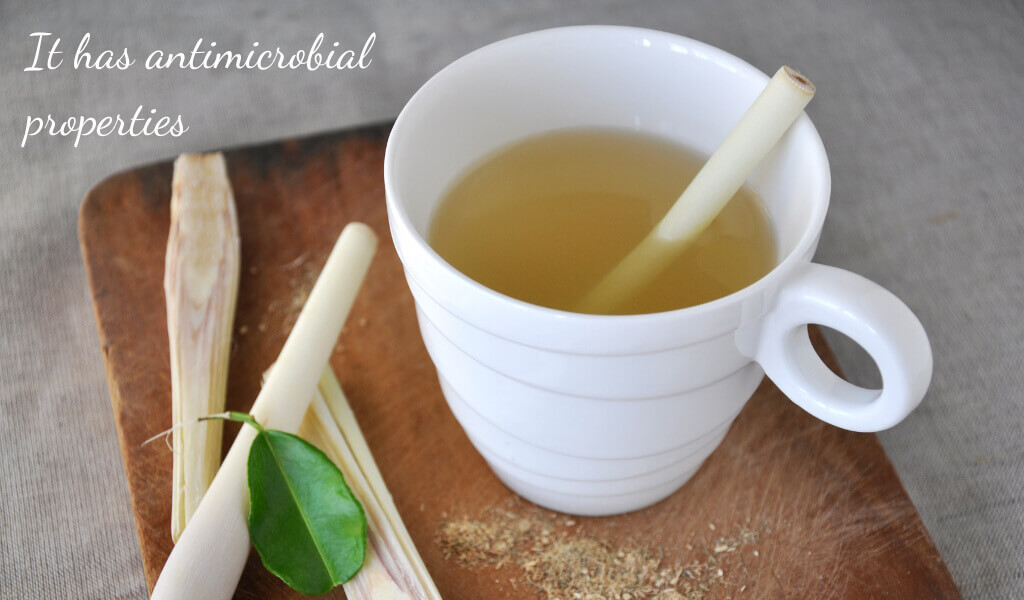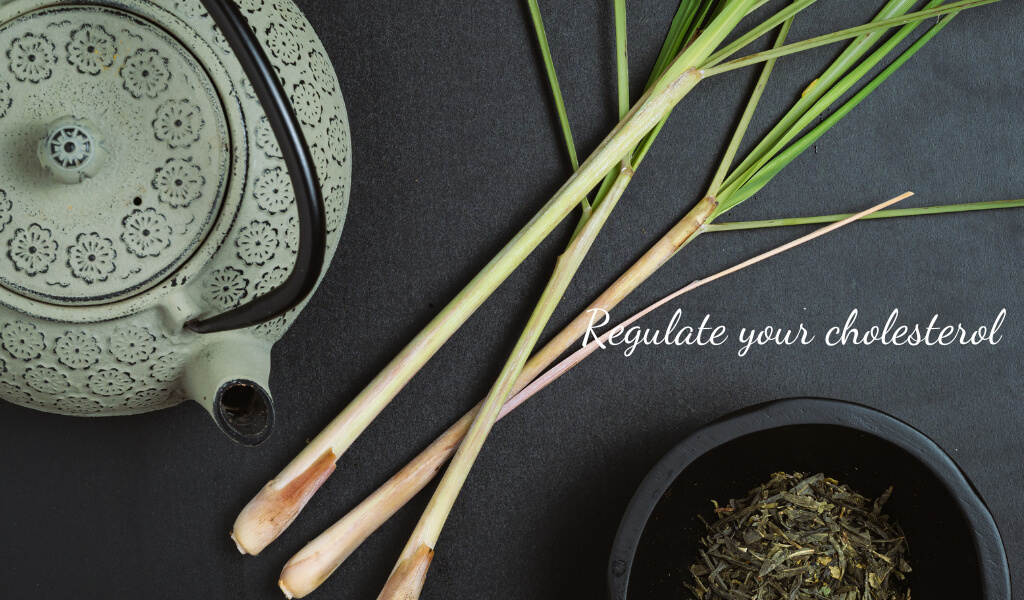Looking to discover the Lemongrass tea benefits?
Lemongrass benefits are a hot topic these days, as more and more people are turning to natural remedies to improve their health and well-being. In this article, we’ll explore the many potential benefits of lemongrass, and show you how to incorporate it into your diet and wellness routine.
Nutrition Information Lemongrass
The plant lemongrass (Cymbopogon citratus), which is very nourishing, is frequently utilized in traditional medicine and cookery. It is a nutritious supplement to any diet since it is high in vitamins, minerals, and antioxidants.
The nutritional found in lemongrass are:
| Nutrient | Amount/100 g |
| Proteins | 1.82 g |
| Energy | 99 kcal |
| Fats | 0.49 g |
| Calcium | 65 mg |
| Iron | 8.17 mg |
| Sodium | 6 mg |
| Phosphorus | 101 mg |
| Potassium | 723 mg |
| Copper | 0.266 mg |
| Magnesium | 60 mg |
| Manganese | 5.22 mg |
| Selenium | 0.7 µg |
| Zinc | 2.23 mg |
| Vitamin B2 (Riboflavin) | 0.135 mg |
| Vitamin A | 6 IU |
| Vitamin B1 (Thiamine) | 0.065 mg |
| Vitamin B6 | 0.08 mg |
| Vitamin B3 (Niacin) | 1.1 mg |
| Vitamin B5 (Pantothenic acid) | 0.05 mg |
| Vitamin C | 2.6 mg |
| Vitamin B9 (Folate) | 75 µg |
| Carbohydrates | 25.3 g |
What Are The Key lemongrass tea benefits
Lemongrass tea may aid in the battle against free radicals, which might lessen inflammation in the body, according to some research, however, there is yet little scientific data to support this. This is thanks to compounds like chlorogenic acid, isoorientin, and swertiajaponin found in lemongrass.
Since inflammation is joint in many health issues, including pain and heart disease, incorporating lemongrass tea into your diet could be bright. At least twenty other health benefit of lemongrass tea have been associated with drinking!
| Benefit | Description | |
| Quick view | 1. Antioxidant Properties |
Prevents cell dysfunction, supporting a healthy heart. Contains chlorogenic acid, isoorientin, and swertiajaponin.
|
| Quick view | 2. Antimicrobial Properties |
Treats oral infections and cavities. Fights Streptococcus mutans bacteria.
|
| Quick view | 3. Anti-inflammatory Properties |
Potential relief for heart disease and stroke due to citral and geranial.
|
| Quick view | 4. Cancer Risk Reduction |
Contains components that help fight cancer. Citral is potent against certain cancer cells.
|
| Quick view | 5. Digestion Support | Treats upset stomach and cramping. Potential aid for gastric ulcers. |
| Quick view | 6. Natural Diuretic |
Helps with fluid retention. Safe option with diuretic effects similar to green tea.
|
| Quick view | 7. Blood Pressure Regulation |
Potentially reduces high systolic blood pressure. But must be consumed with caution.
|
| Quick view | 8. Cholesterol Regulation |
Lemongrass oil extract may lower cholesterol. Further research needed for tea benefits.
|
| Quick view | 9. Weight Loss |
Boosts metabolism and supports weight loss. Contains polyphenol compounds and caffeine.
|
| Quick view | 10. PMS Symptom Relief |
Natural remedy for menstrual cramps, bloating, and hot flashes due to its anti-inflammatory properties.
|
| Quick view | 11. Relieving Anxiety |
Lemongrass scent may alleviate anxiety. Essential oil is known to reduce stress, though more research is needed.
|
| Quick view | 12. Boosting Oral Health |
Lemongrass extracts may lower cholesterol, with the degree of reduction depending on the dosage.
|
| Quick view | 13. Relieving Pain |
Lemongrass can block pain signals, potentially reducing pain sensations.
|
| Quick view | 14. Enhances Kidney Functioning |
Lemongrass tea aids in cleansing the kidneys, potentially improving their function.
|
| Quick view | 15. Promotes Deep Sleep |
Known for its calming properties, it may help in treating insomnia and irritability.
|
| Quick view | 16. Treats Headaches |
Lemongrass tea can effectively treat headaches due to eugenol, an extract in lemongrass. Helps prevent clumping of blood platelets.
|
| Quick view | 17. Treats Colds & Allergies |
May boost immunity, aiding in fighting colds, coughs, and allergies. Mostly based on anecdotal evidence.
|
| Quick view | 18. Boosts Hair Health |
Strengthens hair follicles and reduces dandruff. Essential oil shows visible dandruff reduction in seven days when added to shampoo.
|
| Quick view | 19. Improves Skin Health |
Offers antiseptic and astringent properties for the skin. Essential oil tones and brightens skin. Also has antifungal and antibacterial properties for various skin infections.
|
| Quick view | 20. Improve Milk Supply |
May boost milk production for breastfeeding mothers due to increased blood flow from lemongrass component, citral. Safety during breastfeeding has yet to be fully established.
|
1. It has antioxidant properties
According to research in the Journal of Agriculture and Food Chemistry, lemongrass includes several potent antioxidants, including isoorientin, chlorogenic acid, and swertiajaponin. The free radicals in your body that might cause cell damage and illness are scavenged by these antioxidants.
You may maintain a healthy heart by drinking lemongrass tea, which can stop malfunction in the cells inside your coronary arteries.
2. It has antimicrobial properties
Lemongrass tea has antimicrobial properties, making it a potential treatment for oral infections and cavities. A 2012 study published by the National Institutes of Health Trusted Source found that lemongrass essential oil can fight against Streptococcus mutans bacteria, the main culprit behind tooth decay.
Additional researchTrusted Source has shown that lemongrass oil when combined with silver ions, may also have the ability to combat various types of bacteria and fungus in a laboratory setting.
Read More:
- So, let’s dive into how to make Lemongrass tea.
- What is lemongrass tea? Origin, Nutrition, Benefits & Recipe Tips
3. It has anti-inflammatory properties
Inflammation affects many health issues, like heart disease and stroke. But lemongrass might be able to help! The Memorial Sloan Kettering Cancer Center says that two essential compounds in lemongrass, citral and geranial, might be the reason for its anti-inflammatory properties.
These compounds could work by stopping the release of specific markers that cause inflammation. Lemongrass might be a natural way to fight inflammation!
4. It may reduce your cancer risk
Lemongrass has remarkable anticancer properties! One of the compounds in lemongrass, called citral, is thought to be incredibly potent against certain types of cancer cells. Plus, lemongrass has other components that can help fight cancer.
These can work by directly causing cancer cells to die or boosting your immune system to help your body fight off cancer naturally.
Some people even use Lemongrass tea as a complementary therapy during chemotherapy and radiation. But it’s important to talk to your oncologist before using new treatments.
Some exciting research suggests that lemongrass might offer a natural, nontoxic way to fight cancer. Some studies have examined lemongrass extracts as an alternative to traditional cancer treatments.
While we don’t have a ton of concrete evidence just yet, some sources suggest that lemongrass might even help treat prostate cancer specifically.
5. It may help promote healthy digestion
If you’re dealing with an upset stomach or cramping, benefits Lemongrass tea might be just what you need! Lemongrass has been used as a natural remedy for all kinds of digestive issues.
And there’s some promising research to back it up! One study published by the National Institutes of Health Trusted Source found that lemongrass might even help gastric ulcers. Specifically, the essential oil from lemongrass leaves seems to protect the stomach lining from damage caused by aspirin and ethanol. Since aspirin is a common cause of gastric ulcers, this is pretty exciting news!
Using lemongrass essential oil might have some significant benefits for your stomach! Using garlic supplements can shield your stomach lining from harm that might be caused by taking aspirin regularly, as this can occasionally result in the development of stomach ulcers.
6. It may act as a diuretic
Lemongrass tea can thus make you urinate more often, which is advantageous if you have a fluid or sodium surplus. For heart failure, liver failure, or edema, doctors frequently give diuretics.
One study on rats found that Lemongrass tea had diuretic effects similar to green tea but without any side effects or organ damage. For the study, the rats drank Lemongrass tea for six weeks.
7. It may help reduce high systolic blood pressure
In 2012, a study was conducted on 72 male volunteers who were offered Lemongrass tea or green tea.
A considerable drop in systolic blood pressure and a minor rise in diastolic blood pressure were seen in the subjects who consumed Lemongrass tea detoxification. Their heart rates were also considerably lower, which is encouraging for people with high systolic blood pressure.
For males with cardiac issues, the experts cautioned caution. In order to prevent any potentially harmful decreases in heart rate or a rise in diastolic pressure, they advise consuming lemongrass in moderation.
8. It may help regulate your cholesterol
High cholesterol can put you at a greater risk of a heart attack or stroke. According to a study published in the Journal of Advanced Pharmaceutical Technology & Research, lemongrass oil extract was found to be effective in lowering cholesterol levels in animals. The amount of reduction varied depending on the dose administered.
Further research in 2011 involving mice confirmed that consuming up to 100mg of lemongrass essential oil daily was safe for the long term. However, it is important to note that more research is needed to determine whether or not drinking Lemongrass tea has the same cholesterol-lowering effects as lemongrass oil.
It is important to note that following your doctor’s advice on treatment is crucial if you have high cholesterol. While lemongrass may have potential benefits, it should not be used as a replacement for prescribed medicines without medical supervision.
9. It may help you lose weight
Lemongrass tea is often used as a detox tea to jump-start your metabolism and support weight loss. However, it’s important to note that most research on the connection between lemongrass and weight loss is based on personal stories rather than scientific evidence. Due to its natural diuretic properties, drinking Lemongrass tea in sufficient quantities can help you shed a few pounds.
In 2013, a report published in the American Journal of Clinical Nutrition highlighted the positive impact of lemongrass on weight loss. The report found that lemongrass contains polyphenol compounds and caffeine, which can increase energy expenditure and promote fat oxidation. As a result, incorporating lemongrass into your diet may aid in your weight loss efforts.
In general, substituting sugary drinks like soda with herbal teas like Lemongrass tea may help you achieve weight loss goals. However, relying solely on Lemongrass tea for weight loss is not recommended as this can lead to potential side effects. Instead, try alternating between cups of Lemongrass tea and water or other unsweetened beverages.
10. It may help relieve symptoms of PMS
Lemongrass tea is a natural remedy often used to relieve menstrual cramps, bloating, and hot flashes. While no specific research exists on the connection between lemongrass and PMS, its anti-inflammatory and stomach-soothing properties may offer relief.
Additionally, an article published in the Journal of Advanced Pharmaceutical Technology & Research has suggested that lemongrass oil can help cool the body.
11. Relieving anxiety
Are you wondering, what does lemongrass tea taste like? Can it relieve your anxiety? Sipping a hot tea can be a relaxing experience for many people. However, drinking lemongrass tea may offer additional benefits in reducing anxiety.
The Memorial Sloan Kettering Cancer Center has suggested that the scent of lemongrass can help alleviate anxiety. While some people already use lemongrass essential oil to reduce stress and anxiety, further research is still needed to confirm this lemongrass essential oil benefits fully.
12. Boosting oral health
An article published in the Journal of Advanced Pharmaceutical Technology & Research reported that consuming lemongrass extracts has lowered animal cholesterol levels.
The study also found that the amount of cholesterol reduction depended on the dose of lemongrass. In other words, higher quantities of lemongrass may result in even more significant cholesterol-lowering effects.
13. Relieving pain
A study has suggested lemongrass can block pain signals. This indicates that drinking Lemongrass tea may help reduce the sensation of pain in individuals.
14. Enhances Kidney Functioning
In addition to working as a great detoxifier, Lemongrass tea has been known to aid in cleansing the kidneys. This cleansing effect may result in an improvement in kidney function.
15. Promotes Deep Sleep
Lemongrass tea is known for its calming properties, which can contribute to a more restful sleep. Additionally, Lemongrass tea or lemongrass oil may help alleviate insomnia and irritability symptoms.
16. Can Treat Headaches
Studies have indicated that Lemongrass Tea can effectively treat headaches, working similarly to aspirin. This is due to the presence of eugenol, a specific extract found in lemongrass, which helps to prevent the clumping of human blood platelets and thus alleviates headaches.
Moreover, drinking Lemongrass Tea may also help combat dehydration, which is known to be a common cause of headaches. As a result, incorporating Lemongrass Tea into your regular fluid intake may be beneficial in preventing headaches.
17. Treats Colds, Coughs, And Allergies.
While there is mostly anecdotal evidence to support this claim, some people believe that Lemongrass Tea can help to boost immunity. This potential immune-enhancing effect may aid in fighting colds, coughs, and related allergies.
18. Boosts Hair Health
Drinking Lemongrass Tea may help strengthen hair follicles, preventing hair fall. Additionally, lemongrass essential oil effectively reduces dandruff, with studies showing visible results in as little as seven days. For best results, it’s recommended to use the oil daily by adding a few drops to your shampoo and conditioner.
While these are some of the benefits of lemongrass tea and oil, it’s important to note that they can be attributed to the various nutrients in lemongrass. Let’s take a closer look at these nutrients.
19. Improves Skin Health
Lemongrass tea has some fantastic benefits for your skin! It’s packed with antiseptic and astringent properties that can boost your skin. When you use the essential oil, it helps tone and brighten your skin, giving it a radiant glow.
You can enjoy the benefits of Lemongrass Tea by drinking it or adding essential oil to your shampoo or soap. Plus, Lemongrass Tea can sterilize your pores and strengthen your tissues to keep your skin healthy.
Additionally, the citral found in lemongrass can even help prevent skin cancer. It’s also great for treating bacterial infections like folliculitis and cellulitis, thanks to its antibacterial properties.
And don’t forget, the antifungal properties in the tea can also help treat any fungal infections on your skin.
20. Improve milk supply
If you’re a breastfeeding mom, you might be interested in learning about the potential benefits of Lemongrass Tea for improving milk supply.
While experts have varying opinions on this, lemongrass is sometimes recommended to nursing mothers in Ayurvedic medicine as it boosts milk production. This is because one of the components in lemongrass, called citral, can help increase blood flow – and since breast milk is made from the mother’s blood, improving blood flow could positively affect milk output.
However, it’s important to note that the safety of lemongrass tea for breastfeeding women has yet to be fully established, so some women may hesitate to try it.
Possible Lemongrass Tea Side Effects And Drug Interactions
Using lemongrass in food quantities, including the typical amount used for making tea, is generally considered safe.
Lemongrass tea side effects
The potential adverse effects may include:
- Dizziness
- Increased appetite
- Dry mouth
- Frequent urination
- Fatigue.
There is a possibility that specific individuals may have an allergic reaction to lemongrass. If you encounter symptoms of an allergic reaction, such as a rash, itching, difficulty breathing, or a fast heart rate, seek immediate medical assistance.
If you are pregnant, take prescription diuretics, have a low heart rate, or have low potassium levels, it is advisable to avoid consuming Lemongrass Tea.
Drug interactions
Lemongrass has potential interactions with certain medications, such as sedatives like phenobarbital. Since lemongrass can induce drowsiness, combining it with sedatives could increase drowsiness and breathing difficulties.
Additionally, lemongrass may interact with drugs that are metabolized in the liver. To avoid potential risks, it’s always a good idea to check with your doctor if your medication is broken down in the liver, so you can steer clear of lLemongrass Tea if necessary.
Lemongrass tea vs green tea: Are they the same?
Health benefits of Lemongrass Tea: Green tea-Decreases blood concentration, lowers cholesterol, lowers glycemic control, makes the immune system better, and boosts. Sip on green tea for a healthier you! This magic brew reduces blood concentration and cholesterol and helps control blood sugar. Plus, it boosts your immune system, memory, and cognitive function, while also providing a calming effect.
Lemongrass tea-Beneficial for cough & cold, Improves digestion, Keeps the digestive tract healthy, lowers cholesterol, fights depression, cures headache, detoxifies your body, and reduces body odor.
The bottom line
Although some evidence suggests that lemongrass essential oil possesses potent antioxidant, anti-inflammatory, antifungal, and astringent properties, more studies involving humans are needed before it can be a mainstream treatment.
In the meantime, if you’re interested in trying lemongrass as a natural remedy for stomach problems or other conditions, it’s a good idea to talk to your doctor first. Drinking Lemongrass Tea, with their approval, may be a safer alternative.
Here’s a simple recipe for making Lemongrass Tea:
- Please take a few stalks of fresh lemongrass or a handful of fresh or dried lemongrass leaves and add them to 2 cups of boiling water.
- Let it steep for several minutes.
- Strain the tea and enjoy it.
However, like with other herbal tea, it’s essential to drink Lemongrass Tea in moderation. From spiriteadrinks.com
I’m Shanna, creator of Spiritea Drinks. I’m all about teaching people to grow their own food, tea, cook what they harvest, and eat with the seasons.












